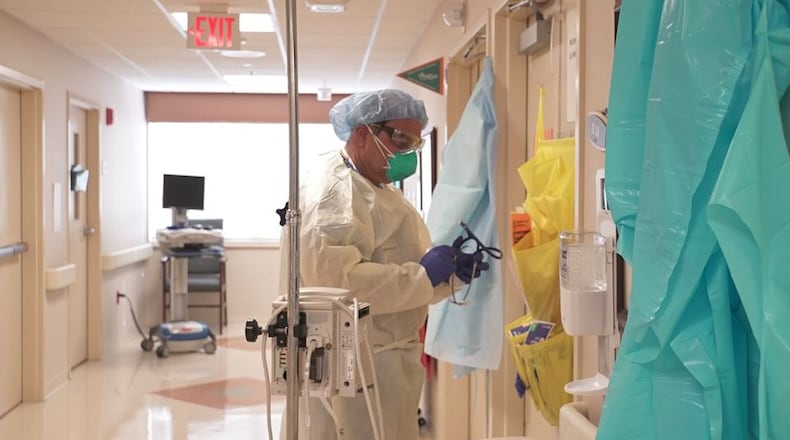Intensive care units across Georgia are overflowing with critically ill COVID-19 patients, creating the latest crisis for hospitals trying to handle a fast-moving surge that hasn’t yet reached its peak.
In 10 of the state’s 14 hospital regions, more than 90% of ICU beds were in use on Wednesday, with two regions exceeding 100% of capacity. The ICUs at some of Atlanta’s largest hospitals were so full they had to divert ambulances carrying patients who needed intensive care. Some hospitals that did have ICU beds open didn’t have the critical care staff needed to use them.
COVID-19 patients who need beds in ICUs are the sickest patients, usually the ones who are struggling to breathe. They need lots of care from nurses and doctors. Many are on ventilators.
“ICUs are sort of the most limited resource we have when it comes to contending with the pandemic partly because of the equipment, but mostly because of the staffing that’s required to support a patient in that bed,” said Amber Schmidtke, a public health expert who studies Georgia’s pandemic data. “We can always wheel in more beds and convert conference rooms into ICUs, but we don’t always have the staff trained in that area to provide the best care.”
Hospitals across the state are struggling to admit patients to their ICUs because of a lack of staff, and it’s even tougher to find a hospital that will accept a transfer patient, said Anna Adams of the Georgia Hospital Association. The surge of patients is also overcrowding Georgia emergency rooms, she said.
Adding stress to the situation is the reality that the worst is not over.
“I don’t think that we’re at peak,” Schmidtke said. “I think we’re still relatively early in Georgia’s delta experience, and because of that it’s very concerning to see the way hospitals have filled as they have.”
Hospitals have resorted to making all kinds of changes to try to deal with the surge.
Piedmont Healthcare paused elective surgeries at its Piedmont Henry and Piedmont Newnan hospitals. Piedmont Henry handles 90,000 emergency patients every year, but even its large facility was overwhelmed with the fourth surge of the pandemic.
“Each wave of the COVID-19 pandemic has forced us to adapt,” said Dr. Lily Henson, Piedmont Henry’s CEO. “We’ve expanded our intensive care unit and converted rooms to care for more patients that require airborne precautions. Now, we are using all of the space we have available to us, placing patients in departments typically used for recovery post-surgery or areas that are typically used as waiting areas for patients and visitors.”
Piedmont said more than 97% of those hospitalized at Piedmont Henry with COVID-19 are unvaccinated. “We are where we are because people, thus far, have refused to get the shot,” Henson said.
The Northeast Georgia Health System put tents back up to increase emergency department capacity at its Gainesville and Braselton campuses. With beds in its emergency departments intermittently full, physicians and nurses had to care for some patients in ambulances.
Credit: Jenni Girtman
Credit: Jenni Girtman
“The entire hospital system is extremely full at all levels of care right now,” said Dr. John Delzell, Northeast Georgia’s vice president and incident commander. “We are near capacity for both medical/surgical beds and ICU beds, and our Incident Command leaders are working hard to stay ahead of the community’s level of need.”
Delzell said this wave of COVID-19 cases was causing more severe illness and was making younger patients seriously ill. The vast majority needing the care are unvaccinated, he said.
In response to the conditions statewide, Gov. Brian Kemp announced steps Monday to expand capacity at regional hospitals and increase health care staffing. Delzell said Kemp’s announcement is allowing the Gainesville-based system to start planning for “alternative care areas” in its hospitals if the need arises.
In the hospital region that includes the Albany-based Phoebe Putney health system, the ICUs are already 100% full.
Dr. Jyotir Mehta, a pulmonologist and medical director of Phoebe’s critical care services, said overflowing ICUs are the biggest challenge facing hospitals right now.
Some patients who need to be in the ICUs sometimes wait for hours in the ER to get a bed. The hospital is also caring for those patients in anesthesia recovery units, he said, until beds open up.
Nurses working in ICUs are caring for three or four patients now, instead of the usual one or two. Doctors have more patients, too.
It’s not just COVID-19 patients they have to worry about. People coming in with other serious illnesses, such as major heart attacks, still need intensive care.
The system is pulling in doctors and nurses from other parts of the healthcare system who have the skills to work in an ICU to help with the load.
“We’re trying to use every resource that we can use,” Mehta said.
When the Albany hospital was one of the hardest-hit in the nation when the pandemic began last year, it could hire doctors and nurses to help with care, and it could send patients to other hospitals. That’s not an option now. Every hospital needs more staff and more beds.
“Now every hospital has COVID patients so the transfer is impossible,” he said. “So whatever comes through your door you have to care of, you can’t transfer them out.”
As of Wednesday, confirmed or suspected COVID-19 patients made up 30% of those in the state’s hospitals, and the trendline appeared to be headed toward the January surge, the peak of the pandemic. Some hospitals in Georgia have already surpassed their previous peaks for COVID-19 hospitalization.
“It’s not just frightening, it’s frustrating,” Schmidtke said.
Few could have imagined that Georgia would see the worst that COVID-19 could present after a vaccine was widely available. “It’s not a failure of the vaccine,” she said. “It’s a failure of society to not take up the vaccine.”
About the Author
The Latest
Featured




